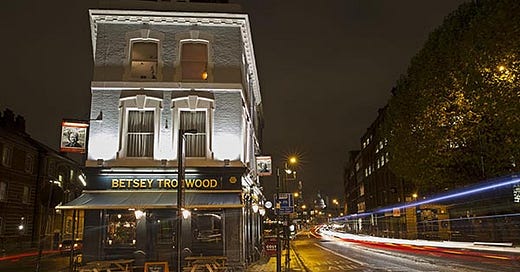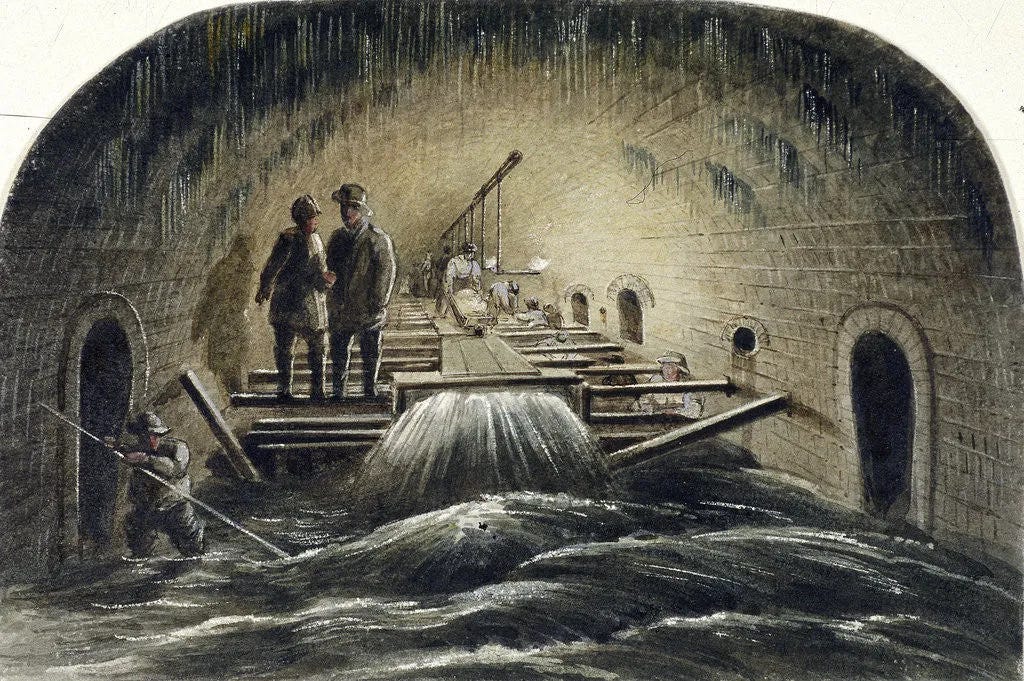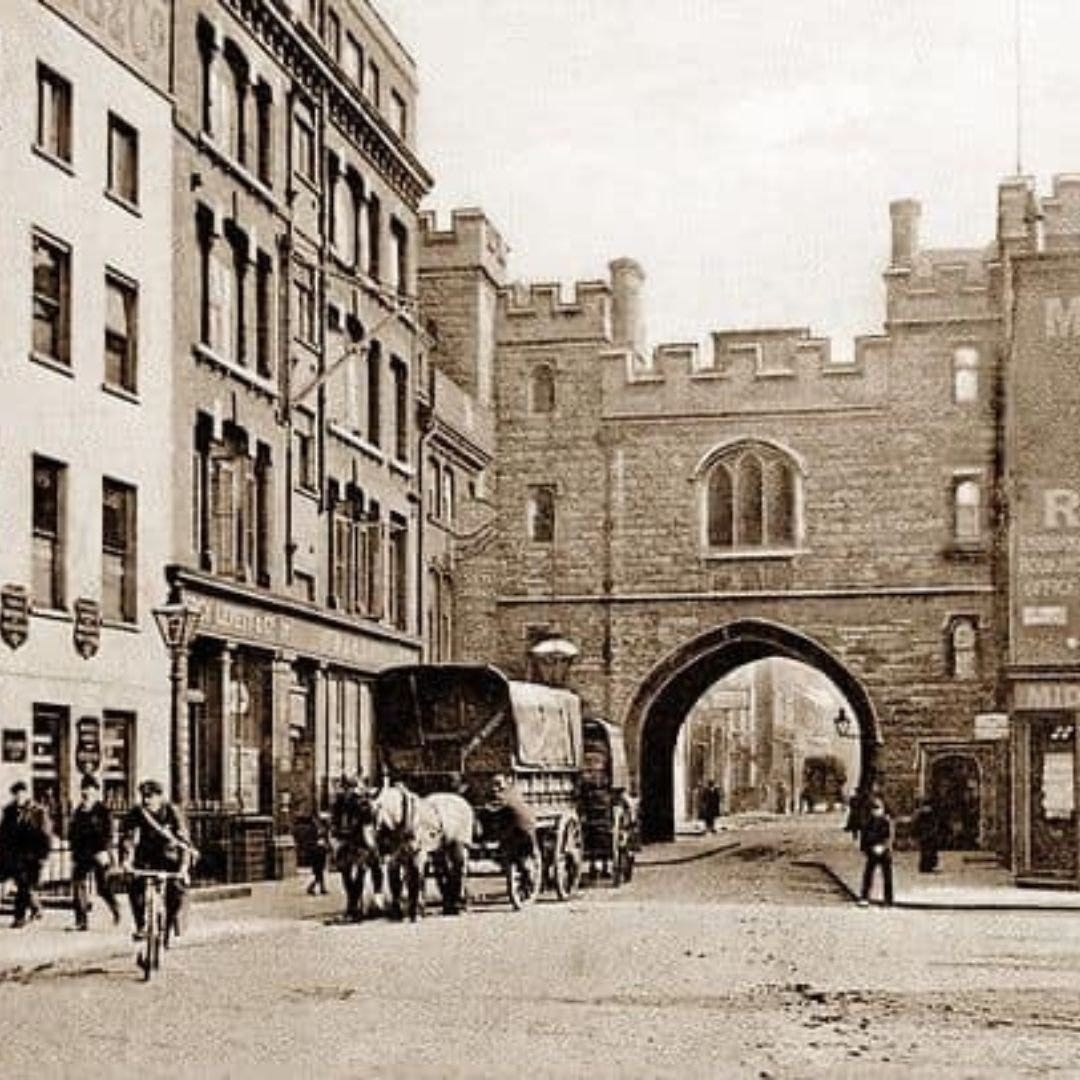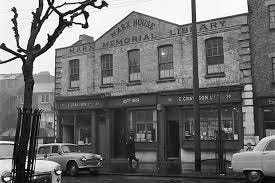Tourists who wander around Clerkenwell after a visit to the Charles Dickens Museum in Doughty Street may find excellent refreshment – real ale and real food along with civilised company - at the Betsey Trotwood pub on Farringdon Road.
Built in 1865 as the Butcher's Arms to serve workers at nearby Smithfield Market, it was renamed in 1983 after the character in Dickens’ David Copperfield.
To be pedantic, Betsey Trotwood didn't live anywhere near the area; it would have been more 'historically' accurate to have named the pub after the Artful Dodger, who inducted poor Oliver Twist into the arts of pick-pocketing at the market on Clerkenwell Green (described by Dickens as 'an open square in Clerkenwell, which is yet called, by some perversion of terms the Green').
As an entertainment venue for music and comedy the Betsey Trotwood has two fine spaces for functions. One of them is in the basement, nicknamed by some the 'Love Dungeon', where performances are regularly enhanced by the rumbling of trains passing below on London's Underground railway. Beneath the railway lies the Fleet, one of London's 'lost rivers'. By the 19th century the Fleet had become a fetid open sewer, requiring stretches of it to be covered over with timber and bricks; but in 1846 sewage gasses exploded, bursting through the streets above, destroying Clerkenwell poorhouses. Now thoroughly bricked over and converted in parts to pipes the Fleet now forms part of the flood and sewage relief system flowing softly into the Thames at Blackfriars Bridge.
The other function room in the Betsey Trotwood, upstairs from the bar, is where AMMAS (the AMM All Stars) regularly congregate to record 'Free Improvised Music' for broadcast on Ben Watson's Late Lunch with Out to Lunch show on Resonance FM radio. AMMAS has no fixed line up beyond availability of the musicians and poets, who drift in and out of town and states of mind. Such decentralisation contradicts rumours that we may be a cult.
The aforementioned Clerkenwell Green and its immediate vicinity has long established associations with the radicalism upheld by AMMAS against all odds; beginning in 1381, when the Priory of the Order of St John was burned to the ground during the Peasants Revolt (it was rebuilt in 1504, and its gate, which survived Henry VIII's dissolution of the monasteries, stands to this day).
In the first half of the 19th century Clerkenwell was home to the artisan cadres of the Chartist movement, who demanded ‘Our Rights - Peaceably if We Can, Forcibly if We Must’. In 1867, Clerkenwell Prison, on St. James Walk, was bombed by Irish Fenians in a failed attempt to free their comrade, Richard Burke. The gunpowder bomb demolished a large part of the prison wall but unfortunately killed 12 residents of an adjacent tenement building. The 'outrage' offended even the most vocal supporters of the Fenians, including Karl Marx, who declared:
'The London masses, who have shown great sympathy towards Ireland, will be made wild and driven into the arms of a reactionary government. One cannot expect the London proletarians to allow themselves to be blown up in honour of Fenian emissaries.'
On Clerkenwell Green, number 37 was built in 1739 as a charity school for children of impoverished Welsh migrants. In 1902, it housed Twentieth Century Press, whose director, Harry Quelch, shared an office with Vladimir Lenin, editor of Iskra (Spark). Quelch printed the Iskra journal and helped smuggle it into Russia, where it was banned. In the 1920s and 1930s, 37 was a venue for Communist Party meetings. The Marx Memorial Library, founded there in 1933, is now restored and flourishing.
There is thus a resonance in Ben Watson calling a recent broadcast of Late Lunch with Out to Lunch 'Free Jazz Communism'. Ben presents music played by Archie Shepp in Helsinki in 1962 plus recordings of Jazz plus Betsey Trotwood sessions of AMMAS.
The Helsinki gig was part of the World Festival of Youth and Students for Peace and Friendship, a controversial event held in Summer 1962, which drew in 14,000 visitors. The festival was controversial because it was sponsored by the Russian government. Since it was held in a neutral country, the CIA saw it as a communist cultural offensive. The CIA secretly sponsored a large counter-festival, fronted by the Congress for Cultural Freedom, which featured abstract paintings flown in from New York’s Museum of Modern Art and a few less ‘radical’ jazz musicians.
The line-up for the Shepp band was Archie Shepp (tenor sax), Bill Dixon (trumpet), Perry Robinson (clarinet), Don Moore (bass) and Howard McRae (drums).
Watson's broadcast also features an AMMAS session with a graphic poem by Out To Lunch called ‘Hot Intimate Breath Disdaining’ which ‘intimates to the avant imitator that sheer sound communicates despite your best-intention paving-stones’. The sounds recorded at the Betsy Trotwood came from: Out To Lunch (acoustic guitar, Yamaha electric keyboards), Graham Davis (synths, harmonica), Ian Dogstar (synth, backing vocals) and Dave Black (electric guitar). Peter Baxter's drums and Robert "Sugarlips" Goldsmith's percussion (‘For Paul’) were added in post-production.
Hear it HERE
Further Recommend Reading
Reds On The Green - A Short Tour of Clerkenwell Radicalism, by ‘Fagin’
Free Jazz Communism. Edited by Sezgin Boynik and Taneli Viitahuhta, the book contextualizes the politics of free jazz music in light of global decolonisation movements, anti-war activism, structures of racial capitalism, and forms of avant-garde music.
Inside the Fleet: exploring London’s lost rivers, by Peter Watts.








Excellent post!